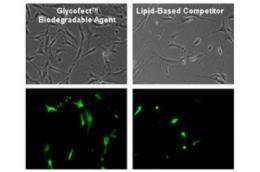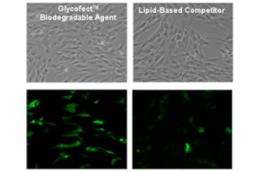New technology to assist research and genetic drug delivery

Techulon, Inc., and University of Cincinnati sign worldwide exclusive license agreements to manufacture and sell novel reagents used for research and therapeutic delivery of nucleic acids.
Techulon, Inc., a life sciences company, has signed worldwide exclusive license agreements with the University of Cincinnati to manufacture and sell novel transfection reagents used for research and therapeutic delivery of nucleic acids. The licenses cover a family of new molecules invented by Theresa M. Reineke while she was a faculty member in the Chemistry Department of the McMicken College of Arts & Sciences and described in two patent applications filed by UC.
"The polymeric transfection agents we have licensed from the University of Cincinnati are an exact fit for our business," states Frank Akers, president of Techulon. "Our ionic biopolymer expertise and infrastructure allow us to bring products to market almost immediately. Our first product, Glycofect, is especially effective in transfecting DNA into cells because of its low toxicity and efficiently induced transgene expression. These qualities make Glycofect especially suitable for sensitive and difficult-to-transfect cell lines or primary cells."
Marketed under the name of Glycofect Transfection Reagent, the new polymer-based formulations demonstrate unparalleled efficacy for delivering genetic materials into a variety of cell types for health-related research and drug development.

In contrast to currently used lipid-based transfection reagents that dominate a growing $100 million market, Techulon's products are based on novel carbohydrate polymer structures invented by Reineke, now an associate professor of chemistry at Virginia Tech.
"This new class of polymers can deliver DNA research reagents and therapeutics into a high number of cells and tissues types without causing cell damage or death," Reineke says. "After cellular delivery, the glycopolymers degrade and release their DNA cargo to perform its biological function without toxic side effects."
"We intend to expand our transfection reagent offerings, plus we have sublicenses available for companies needing a highly efficient vector with low toxicity to aid in their drug discovery," says Akers. "Techulon has strong developmental and synthetic capabilities headed up by Joshua Bryson, who studied under world-renowned biomaterials researcher Theresa Reineke at the University of Cincinnati. Techulon will work in partnerships to tailor our delivery vehicles for optimal effectiveness of novel genetic tools and drugs."
Bryson, principal scientist at Techulon, adds, "The exceptional delivery, high gene expression, and low toxicity of Glycofect are particularly evident in primary cells. This is of great benefit to biological and medical research because current transfection reagents do not work well with primary cells and these cell types are very costly and difficult to obtain."
Glycofect has been sampled to a number of medical research laboratories that have identified a broad spectrum of applications. In some cases, Techulon is cooperating with researchers to tailor the Glycofect formulations to optimize results for a variety of applications including siRNA delivery. Glycofect will be available for purchase as a transfection reagent for research applications on April 1, 2010. Techulon also plans to sublicense Glycofect for therapeutic development.
Provided by University of Cincinnati

















